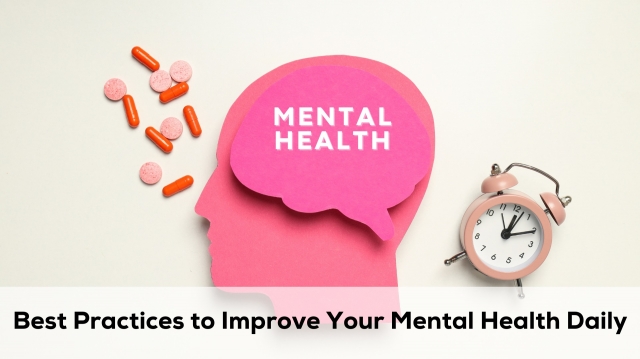Have you ever wondered how to better take care of your mental health? Mental welfare is mostly prioritized. Simple activities done each day can improve very much the emotional and psychological resilience of yourself. This blog will be a guide to different evidence-informed strategies that can fit very much with your routine. From physical exercises to mindfulness practices, learn how to foster a balanced and meaningful life through these tips. Let's explore how these practices can be seamlessly incorporated into daily routines for better mental health.
Physical Exercise: Boost Your Mood and Mind
Regular physical exercise could improve your mental health significantly. Some of the exercises are jogging, swimming, walking, or cycling. These activities help an individual release endorphins from his body's natural "feel-good" chemicals. Revenue in the mental health market is projected to reach US$38.42bn in 2024.
Many fitness centers and studious businesses are becoming famous all over the world. Aim for at least 150 minutes of moderate-intensity aerobic exercise weekly, along with muscle-strengthening activities on two or more days per week is a great treatment for anxiety Since the daily mental health tip usually says to keep the body active.
Reduced stress and anxiety, improved sleep quality, and enhanced self-esteem are benefits of physical exercise. Esteemed achievements, however little they may be, add to your confidence in a big way.
Prioritize Social Connections
Connecting and bonding with such people would be very meaningful; and important for our mental well-being. Time with friends and family is one, but try to join some social or community group, or support groups if it's meant to be.
These interactions provide emotional support, reduce feelings of loneliness, and enhance your sense of belonging. Ways to enhance social connections include joining clubs or groups that interest you, volunteering to foster a sense of community, and scheduling regular meet-ups with friends and family to strengthen relationships.
Social engagement-focused practices can significantly enhance overall mental health.
Practice Self-Care Regularly
Self-care involves activities that nurture your physical, emotional, and psychological health. This includes getting adequate sleep, eating a balanced diet, and engaging in leisure activities that bring joy and relaxation.
Incorporate mindfulness practices, such as meditation or deep breathing exercises, to help manage stress and improve emotional regulation. Regular self-care is a cornerstone of daily mental health improvement.
Strategies for self-care include mindfulness meditation, engaging in hobbies that bring joy and relaxation, and ensuring you get 7-9 hours of sleep per night to rejuvenate your body and mind.
Develop a Positive Mindset
Combat negative thinking patterns by challenging irrational thoughts and replacing them with positive beliefs. Cognitive-behavioral therapy (CBT) techniques can be particularly helpful in this regard. Practice gratitude by keeping a journal to note things you are thankful for, which can shift your focus to positive aspects of your life.
Tips for a Positive Mindset
- Gratitude journal: Write down three things you are grateful for each day.
- Positive affirmations: Use daily affirmations to reinforce a positive outlook.
- Challenge negative thoughts: Identify and reframe negative thoughts into positive ones.
Create Healthy Sleep Habits
Good sleep is essential for maintaining optimal mental health. Develop a consistent sleep schedule, create a relaxing bedtime routine, and minimize exposure to screens before bed. Ensuring your sleep environment is comfortable can help improve sleep quality and reduce the risk of mood disorders.
Healthy sleep habits include going to bed and waking up at the same time every day, creating a bedtime routine that helps you unwind, and avoiding screens at least an hour before bed to improve sleep quality. This practice is a key part of daily mental health tips aimed at improving well-being.
Limit Social Media and Screen Time
Excessive screen time and social media use can negatively impact mental health. Set boundaries for screen time, take regular breaks from devices, and engage in activities that do not involve screens.
It can alleviate depression and anxiety, even focus. Limit screen time by having regular breaks from all screens for a time, making specific parts of the home a screen-free zone, and using spare time for hobbies, exercises, or face-to-face interactions. These practices can help bring mental health back to reclaiming focus and improving mental well-being.
Practice Mindfulness and Meditation
The engagement in mindfulness practices like meditation has the potential to heighten present-moment awareness while fostering a positive and reflective outlook. These practices have inherently demonstrated their effectiveness in reducing stress, anxiety, and depression, in addition, to enhancing overall mental well-being.
Mindfulness techniques include guided meditation, deep breathing exercises, and other mindful activities such as yoga or tai chi. These are the kinds of things mental health tips most frequently suggested daily and with which practice improves, simple enough but effective for one's mental health.
Maintain a Balanced Diet
There is an appropriate diet that is healthy in supporting mental health and physiological nourishment along with some beneficial nutrients to cope with the stress. Consume more fruits, vegetables, whole grains cereals, and lean meats. Avoid taking too much of those foods that are high in calories and fat, as they tend to result in mood swings or lower self-confidence.
Healthy eating tips include taking well-mixed macronutrients within a meal, drinking lots of water throughout the day, and practicing mindful eating to avoid stress. This is advice for mental health improvement because it reflects nutrition.
Comparison Table: Daily Mental Health Practices
|
Practice |
Benefits |
Tips for Implementation |
|
Physical Exercise |
Reduces stress, improves sleep |
150 minutes of aerobic exercise weekly |
|
Social Connections |
Provides emotional support |
Join clubs, volunteer, and regular meet-ups with loved ones |
|
Self-Care |
Enhances overall well-being |
Mindfulness, adequate sleep, leisure activities |
|
Positive Mindset |
Boosts mood and resilience |
Gratitude journal, positive affirmations |
|
Healthy Sleep Habits |
Improves sleep quality |
Consistent schedule, relaxing bedtime routine |
|
Limit Screen Time |
Reduces anxiety, improves focus |
Scheduled breaks, screen-free zones, alternative activities |
|
Volunteer Work |
Increases self-esteem, reduces stress |
Community volunteering, small acts of kindness |
|
Time Outdoors |
Reduces stress, boosts energy |
Nature walks, outdoor hobbies, sunlight exposure |
|
Mindfulness and Meditation |
Reduces stress and anxiety |
Guided meditation, breathing exercises, mindful activities |
|
Balanced Diet |
Supports mental health |
Balanced meals, hydration, mindful eating |
Conclusion
When you use these best practices in your everyday life, your mental well-being can truly be improved, your mood elevated, and your well-being transformed. Through physical fitness, social connection, or just mindfulness practice - every little step you take goes toward finer mental health and a happier as well as healthier life.
FAQs
How can I start incorporating these practices into my daily routine?
Begin by setting small, achievable goals. For example, start with a short daily walk, practice gratitude journaling each morning, or set aside 10 minutes for meditation. Gradually build these habits into your routine. Consistent application of these mental health tips will help you see improvements over time.
What if I don't have time for all these practices?
It's essential to prioritize activities that resonate most with you. Even incorporating a few of these practices can make a significant difference. Focus on what fits best into your lifestyle and gradually add more as you can. Daily mental health improvement can be achieved with small, consistent efforts.
How long will it take to see improvements in my mental health?
Improvements can vary from person to person. Some may notice positive changes within a few weeks, while for others, it may take several months. Consistency is key, so keep practicing these habits regularly. Mental health practices require an ongoing commitment to lasting benefits.






